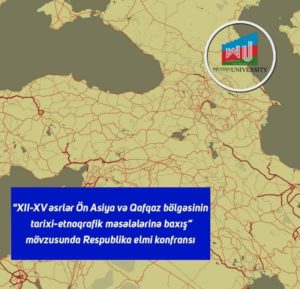
Middle East History Professor Nabil Al-Tikriti recently spoke at a virtual conference hosted by Western Caspian University of Baku, Azerbaijan.
On 18 December 2020, Middle East History Professor Nabil Al-Tikriti spoke at a conference entitled “XII-XV əsrlər Ön Asiya və Qafqaz bölgəsinin tarixi-etnoqrafik məsələlərinə baxış / Perspectives on Historical and Ethnographic Issues Concerning 12th-15th Century Western Asia and the Caucasus Region.” The international conference, offering presentations in Azerbaijani Turkish and English, was hosted by Western Caspian University of Baku, Azerbaijan, and took place entirely online.
The title of Al-Tikriti’s presentation was “Observations on the Nagorno-Karabakh Conflict’s 10 November Resolution.” Addressing a mostly Azerbaijani audience, in the course of this talk, Prof. Al-Tikriti offered the following points about the recent conflict’s current ceasefire and steps for longer term resolution:
1) He has never seen as bitter a conflict as this one, and he has witnessed several well-known conflicts.
2) The mass hatred all around must be brought to an end, sooner rather than later.
3) The huge difference between what is said for international consumption and what is said for domestic consumption needs to be reduced.
4) Both sides are living in parallel realities, and the discrepancy between those parallel worlds must be reduced.
5) The weaponization of historical memory must be put to an end, and both sides must stop pretending like the other side doesn’t exist.
6) Azerbaijan should now act generously, because if they repeat Armenia’s earlier mistake of being content with triumphantly maintaining a frozen conflict, it will come back to haunt them some day, due to shifting factors domestically and internationally.
7) Both sides may have now opened themselves up to increased Russian-Turkish neo-imperialism — if they desire genuine independence, they must negotiate directly with each other.
8) War crimes are unacceptable, and must be prosecuted — otherwise, no good will is foreseen.
9) The 2006 Julfa destruction was unacceptable, and should be both punished and restored to the extent possible.
10) As a sign of good will, Azerbaijan should open up rail lines, transport links, etc.
11) Azerbaijan should negotiate granting Nagorno-Karabakh autonomy.
12) Both sides should secure external peacekeepers (i.e. not Russian or Turkish) to guarantee both the Lachin and Zangezur corridors.
Prof. Al-Tikriti’s thanks the organizers for this opportunity to present his reflections on the recent conflict, and hopes that a just peace will soon prove viable in the South Caucasus.